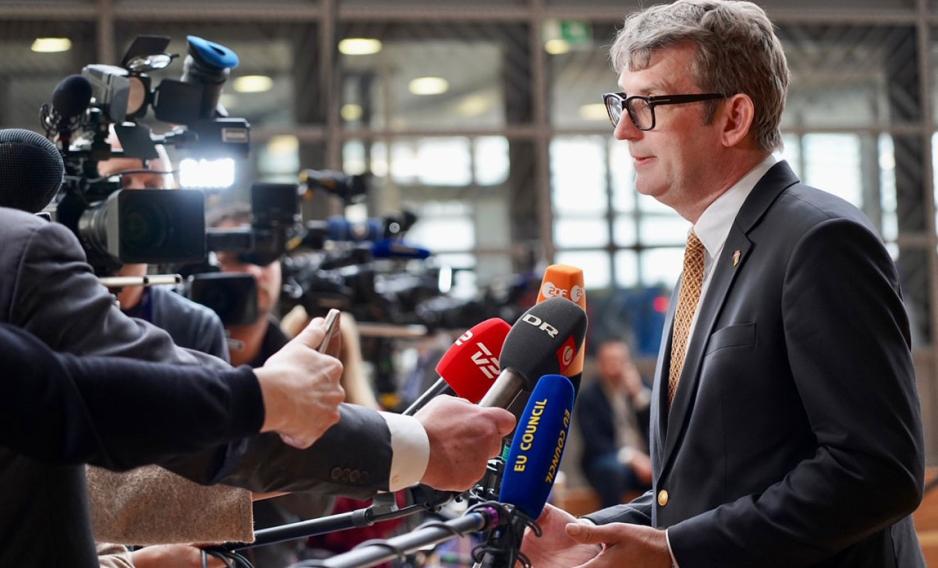Denmark to Strengthen Defense in the Arctic and the Baltic Sea

The Danish government is planning to strengthen defense in the Arctic. "The aim is still for the Arctic and the North Atlantic to be a low tension area," says Acting Minister of Defense Troels Lund Poulsen. (Archive photo: the Danish Ministry of Defense)
The Danish government has presented a defense agreement with a proposed investment of DKK 143 billion over the next ten years. The agreement lays the basis for Denmark to increase its focus on defense in the Arctic and its immediate areas in the East.
On Tuesday, the Danish government presented its proposal for a defense agreement, laying the basis for investing DKK 143 billion in Danish defense and security in the next ten years.
"We must, to a higher degree, be able to live up to the demands and expectations NATO and allies have for Denmark. Significant investments in the Armed Forces are required for us to take our part of the responsibility in NATO. At the same time, today's defense must also be able to handle more than military threats," says Acting Minister of Defense Troels Lund Poulsen (Left).
"Our society's resistance must be increased and the Danish Armed Forces must contribute so that it will be better equipped to handle new threats against society, such as cyber-attacks and attacks on critical infrastructure," he adds.
The aim is still for the Arctic and the North Atlantic to be a low tension area.
Three areas for efforts
As High North News has previously reported, Poulsen has previously stated that the Faroe Islands and Greenland are highly prioritized areas when it comes to defense funding.
"First comes the Arctic and the Kingdom of Denmark, then the Baltic Sea and Denmark's immediate areas," said Poulsen to the Danish newspaper Jyllands-Posten.
In the proposal that was presented yesterday, the Danish government points to three geographic areas for efforts for the Armed Forces, in which Denmark will take on greater responsibility. Among these are precisely the Danish Realm with Greenland and the Faroe Islands, as well as immediate areas in the East.
"With a stronger Danish defense, the government wants to direct our efforts toward three areas in the time coming. This applies to the Danish Realm, to which we have a particular commitment," says Poulsen and continues:
"Of course, we must protect Denmark and live up to our commitment to take our shared responsibility for the security in the Baltics and the Baltic Sea. "
"At the same time, Denmark must continue to significantly support Ukraine – we are sending a clear signal by allocating a total of DKK 32,6 billion until 2028. And we must continue to be active and to be able to send contributions to the rest of the world. Here, our commitment to the EU plays an important role."
The Arctic and the Baltic Sea
When it comes to the Arctic and the Danish Realm, the government writes that the Armed Forces are to contribute to security all across the Danish Realm, in close cooperation with relevant security authorities and with a focus on the various security policy conditions in Denmark, Greenland, and the Faroe Islands respectively.
Another stated aim is for the Arctic and the North Atlantic to continue to be low-tension areas, in which potential conflicts are solved peacefully.
"With this aim in mind, Denmark will contribute even more to fulfilling allied and NATO's interests in the region. The government will therefore improve the surveillance and assertion of sovereignty in the region with the close involvement of the Faroe Island's Landsstyre [governing council] Naalakkersuisut [Greenlandic government] and in close cooperation with allies, in particular the US," writes the government.
"At the same time, the Armed Forces' efforts should, as far as possible, be of benefit to the Faroese and Greenlandic societies to a broader extent, and the capacity of supporting the civilian preparedness on the Faroe Islands and Greenland will increase in step with the general strengthening of the Armed Forces."
Based on the government's presentation of the defense agreement, it appears that the biggest military task in the coming years will revolve around Denmark's security and the immediate area in the East.
"In the Baltic states and the Baltic Sea region, Denmark has, with our other Nordic allies, a particular responsibility for security and important security policy interests. The Armed Forces will therefore be strengthened to be able to contribute more to NATO's joint deterrence and defense," reads the document.
The government begins negotiations in Parliament about the upcoming defense agreement this week.
Also read
This article was originally published in Norwegian and has been translated by Birgitte Annie Molid Martinussen.


